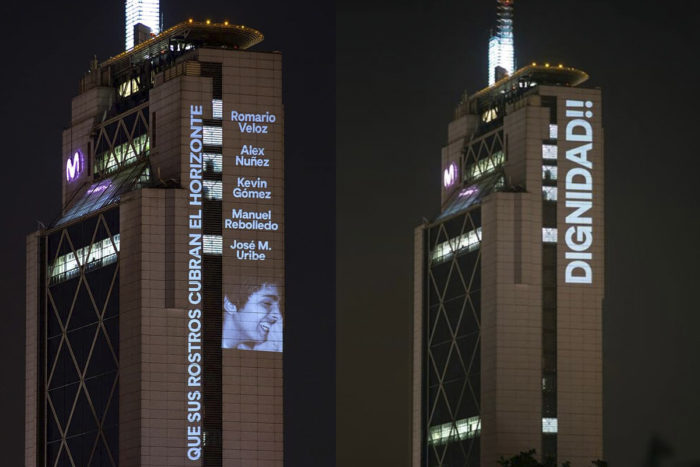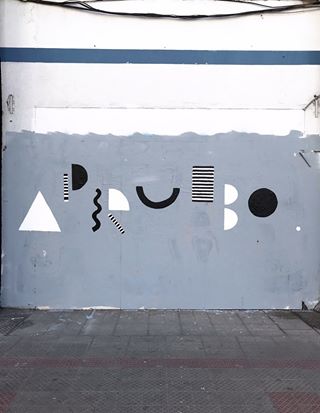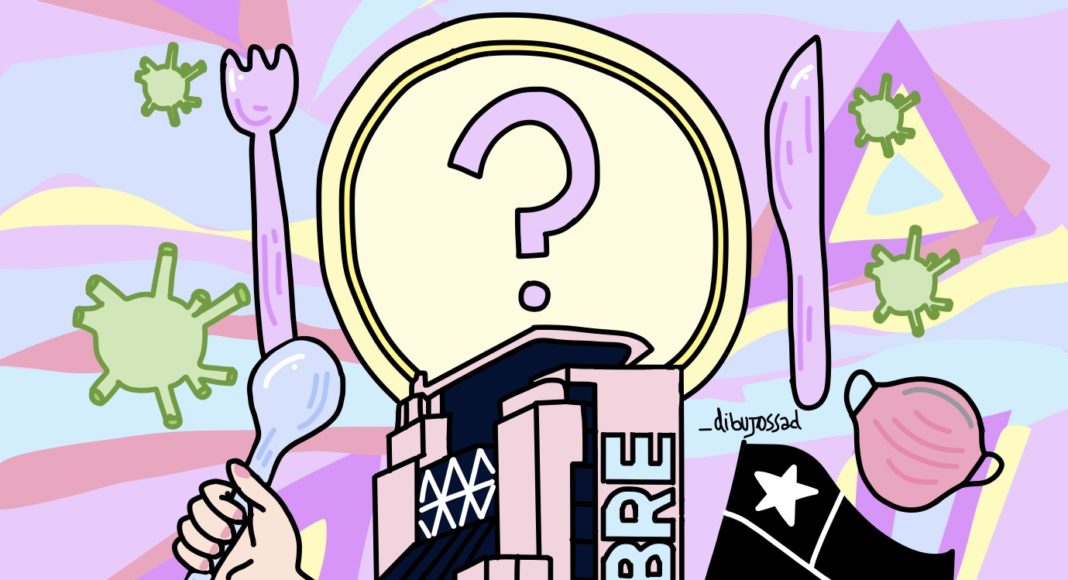Chile’s protests were thwarted when the arrival of Coronavirus forced the population to stay at home. As the impact of the quarantine takes its toll and people are becoming desperate for food, one art collective is censored and attacked for highlighting the struggle.
Main image courtesy of _dibujossad.
At the end of last week, LAB received an urgent appeal from Chilean artistic collective, Delight Lab explaining their fears after ‘becoming the victims of threats, intimidation, hacking and censorship’.
Delight Lab is an audiovisual light studio that has been working in art and culture for the past ten years. Their work uses light projections to create stage backdrops, adverts, and museum exhibitions. They often deal with topics related to social and environmental crises both in Chile and abroad. Their aim is ‘to express creatively, in a peaceful and silent way, a universal sensibility using light alone.’
During the social upheaval and protests that began in October 2019 in Chile, Delight Lab began to make projections on the Telefónica tower. The tower lies next to Plaza de la Dignidad (Plaza Italia), which was the epicentre of the demonstrations in Santiago. The projections were widely shared on social media and included some of the protesters’ key slogans.

However, Delight Lab’s most recent exhibition has put artists Octavio and Andrea Gana under threat.
On Monday 18 April, they projected Hambre [hunger] on the same Telefónica tower. Earlier that day, protesters had broken the quarantine enforced to prevent the spread of Coronavirus. Around a hundred residents of El Bosque, a poor Santiago neighbourhood, took to the streets shouting, ‘We are hungry!’ The protests spread to other areas of the city, where residents insisted on their need for work and help. In La Pintana, another working class neighbourhood in the capital, protesters repeated ‘We prefer to die of Coronavirus than of hunger.’
In reaction to Delight Lab’s projection, the artists behind it were bombarded with threats and abuse via both the organisation’s social networks and their own personal accounts. They were warned to ‘be careful’ and that ‘there would be consequences’ if they continued to produce their art.
They were also verbally attacked by Diego Shalper, a deputy from the centre-right party Revolución Nacional. Shalper described the artists as ‘miserable’. He demanded that Delight Lab be investigated for pursuing ‘political ideology and an agenda which included violence.’ He alleged that they were conspiring with extreme left groups to spread messages of hate, to incite violence, and to destabilise Chile.
Delight Lab, on the other hand, say that the violence is contained in Shalper’s declarations, not their own. Delight Lab believe his declarations amount to ‘an incitement to others to carry out the persecutions and threats’ they have received.
Video: articshockrevista.com.
The organisation’s Instagram account had been hacked and deleted the day before. It had been their main platform for exhibiting their work.
On Tuesday 19 April, Delight Lab continued their projections on the Telefónica tower. This time, they sent the word Humanidad [humanity] beaming onto the tower. But the word was soon made illegible as it was blocked out by another light coming from a van parked a few blocks away and protected by carabiñeros (Chile’s police force). As Delight Lab protest in their appeal, this was a clear act of censorship and an ‘attack on freedom of expression’ that only serves to reaffirm their message.
Art has been censored in Chile even after the return to democracy in 1990. The actress Patricia Rivadeneira’s imitation of the crucifixion, dressed only in the Chilean flag, caused outcry amongst the clergy and conservative political class. Arturo Duclós’ creation of the Chilean flag using femurs also caused controversy because it was a reminder of the disappeared victims of the dictatorship. The documentary maker, Elena Varela, was arrested for making a documentary about the conflict between the Mapuche people and the Chilean government.
More recently, the protest art that had covered walls of public buildings and monuments throughout Chile has been painted out by authorities. Just hours after Santiago entered quarantine in March to prevent the spread of Coronavirus, orders were sent out to erase the graffiti, posters, and other works that dominated the streets of the capital. Some CLP$250 million (around £250,000) were allocated to the ‘clean up’.
Meanwhile, it is being reported that the monetary aid promised to poor Chileans to mitigate the economic impact of the coronavirus has not been received. Although Chile has the lowest rates of informal work in Latin America, 2.6 million people work in the informal economy. According to Rossana Castiglioni, a political scientist from Universidad Diego Portales, they have not received a penny. The Economic Commission for Latin America and the Caribbean (CEPAL) predicts that pension payments will be drastically reduced in a privatised system that already leaves many below the poverty line.

Food aid baskets began to be distributed in the capital in the few days before the protests. Ollas comunes [common pots, or soup kitchens] are springing up across the capital to feed people who have no other choice. The ollas serve as another reminder of the dictatorship era and the economic hardship of the 1980s. Cacerolazos (pot banging protests) were also heard in the centre of Santiago on the same day as the protests in El Bosque. This form of protest was common during the dictatorship as a protest against food shortages.
Castigliono adds that without food, basic goods, and income, it will be very difficult for informal workers to follow the Chilean government’s stay at home message. The outlook for the working class and, increasingly, the precarious middle class, is grim indeed while the pandemic lasts. CEPAL predicts that the level of extreme poverty in Chile will rise by between 0.7 and 1.2 percentage points, while the level of poverty will rise between 2.1 and 3.9 percentage points.
Delight Lab has received support both from within Chile and internationally. They posted their thanks on their Instagram page four days after sending out their appeal, restating that they are not ‘at war’ but ‘love light’. They affirmed their faith in art’s ability ‘to visualise both social and environmental hidden problems’ and hope to ‘sensitise the consciences of people to have fairer, more lucid, and empathetic societies.’
The pandemic continues to highlight the flaws in the Chilean political system, to strengthen the demands of those who protested seven months ago, and reveals the urgent need for change. However, attacks such as those on Delight Lab demonstrate the unwillingness of the establishment to see that reality or to act to improve it.

